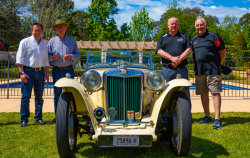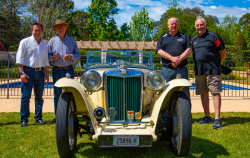The Historic Vehicle Log Book trial
Further updates of the Historic Logbook trial can be accessed via the link:-
Historic Vehicle Conditional Registration Schemes (HVS & CVS)
Update 2/10/2019
HISTORIC AND CLASSIC LOG BOOKS HERE TO STAY

L to R: Minister for Regional Transport and Roads Paul Toole, Thoroughbred Sports Car Club President Stephen Knox, Australian Confederation of Motor Clubs President Tony O’Donnell, Council of Motor Clubs Membership Secretary Lester Gough
- Paul Toole MP
- L toR: Paul Toole MP, Stephen Knox President TSCC
Update 7/3/2016
We are eagerly awaiting the official announcement of the introduction of the new conditional registration scheme for light vehicles over 30 years old. The Scheme is being referred to as the CVS for “Classic Vehicle Scheme” and will be available to almost all vehicles under 3.5 tonne GVM that are over 30 years old.
As with the present HCRS (Historic Conditional Registration Scheme) the new scheme will be club operated and a new form similar to the form 1259 will have to be completed by Club Registrars with the club stamp affixed before an application for registration can be processed.
Vehicles that have been modified in any way should be moved from the H-plate (HCRS) scheme to the new scheme.
The benefits and costs of the new scheme are expected to be very similar to the present H-plate scheme including the 60-day log book.
We expect to be able to discuss the new scheme conditions and method of operation at the next general meeting of the NSWSMA being held in the Yass Soldiers Club on 2nd April 2016 commencing at 10am. All member clubs are encouraged to attend.
Update 4/12/2015
The next step in the log book trial is for those on the trial who are coming up to re-registration now or soon.
With regard to renewing the registration of your log book vehicle it is pretty much as before….
The renewals require either a pink slip or a club authorised person certifying roadworthiness on the form 1259 Historic Vehicle Declaration.
In respect of that form, registrars will be pleased to know that the box requiring the club stamp will be reinstated on the form when reprinted.
Registrars should stamp the form when renewing H-plate registrations even if the box is not there on the form they are using.
Other than that form 1259, owners should arrive at the counter with the previous registration document, their ID (drivers licence) and their Certificate of Approved Operations. The latter form is not actually required but would be if owners wanted to change anything relating to secondary clubs for example.
The old log book is not required by RMS but clubs have been encouraged to require that the owner present the old logbook to the registrar as a matter of course for annual inspection when seeking renewal. Hopefully for the most part registrars will have no reason to be interested in the old logbook but there may be instances where that is not so. Also keep in mind that if you are approached by the police in regard to previous outings having a record would be of value.
Added to this club members are advised to keep a separate diary of their involvement in club/gazetted runs to justify non-logbook runs at a later date if required.
Update 30/10/2015
RMS have provided an update of the plans for the progressive introduction of the log book scheme at : RMS Classic Vehicle Log Book Trials
Before your members can opt into the scheme your club must register with RMS at: Historic.vehicle.logbook.trial@rms.nsw.gov.au
Click here to see if your club has registered its interest in the new log book trial and is now registered.
On October 15th. The Minister Hon Duncan Gay made a statement in NSW Parliament regarding what is now known as ” The Classic Vehicles Registration Scheme” or CVRS.
This is the link to Hansard:
http://www.parliament.nsw.gov.au/Prod/parlment/hansart.nsf/V3Key/LC20151015023?open&refNavID=HA8_1
And here is the text:
The Hon. DUNCAN GAY: I thank the Hon. Rick Colless for his question. I note his interest in and enjoyment of classic cars. Approximately 300,000 New South Wales people, who are members of car clubs and associations, enjoy owning and safely operating classics. Statistics show that those rare and valuable cars are driven carefully. They are involved in very few accidents, are safe, and are better maintained than is the general car fleet. I proposed a two-year trial of a logbook-based conditional registration scheme for cars 30 years or older and weighing less than 3.5 tonnes. The trial rollout will be in two stages. Those who are eligible for current historic plates are in the first stage. The second stage, which will be early in 2016, will be for non-original and modified vehicles that must be eligible and certified for full registration. The compulsory insurance component will be sorted out before the second stage can be rolled out. Conditional registration will be cheaper than is full registration. This is an opt-in trial through recognised clubs that will offer additional advantages of up to a total of 60 days logbook recorded use, which will allow for the occasional Sunday afternoon drive with the family. Those 60 days of use are not intended to be in addition to any other scheme. The logbook scheme does not replace the historic plates in the historic vehicle scheme, which will remain untouched. The role of recognised clubs is critical to this proposed trial. The trial and the final scheme will strengthen recognised clubs and associations, which are recognised for their positive peer influence. The trial can be accessed only through recognised club membership. People who do not fit into an existing scheme and who are not club members therefore will need to join a club that is recognised by Roads and Maritime Services [RMS] to access the trial and the final scheme. Clubs will opt in, or not, as they choose. There is no compulsion. If a club opts in, not all members will take advantage of the logbook-based registration scheme, but I believe that most will. It is a matter of the club opting in, and then a matter of personal choice. I am aware of the desire of many H-plate holders, if they move to the logbook scheme, to preserve their plates. The Government is still working through the best mechanism by which to implement the scheme and allow people to preserve their existing H-plates, as they wish to do. This great and long overdue initiative will be welcomed by motoring enthusiasts who love their classics. It will preserve and allow the use of our motoring heritage and strengthen the large motoring aftermarket industry, which is worth approximately $11 billion a year and employs 30,000 people across Australia. The proposed scheme will be a win-win. Those who own these great vehicles largely get to drive them only to events organised by their clubs. They would like to enjoy the feeling more often of driving their vehicle. This scheme will be a win-win for them. Classic car owners have been asking for this scheme for a number of years. Preparations for introduction of the scheme have not been without difficulty. I congratulate all those from motoring clubs and in RMS who have worked together to achieve it. The first stage of the scheme is complete and we soon will be working on the second stage. The scheme is pretty much together. I thank classic car owners and everyone else involved for their support, and I wish them well.



